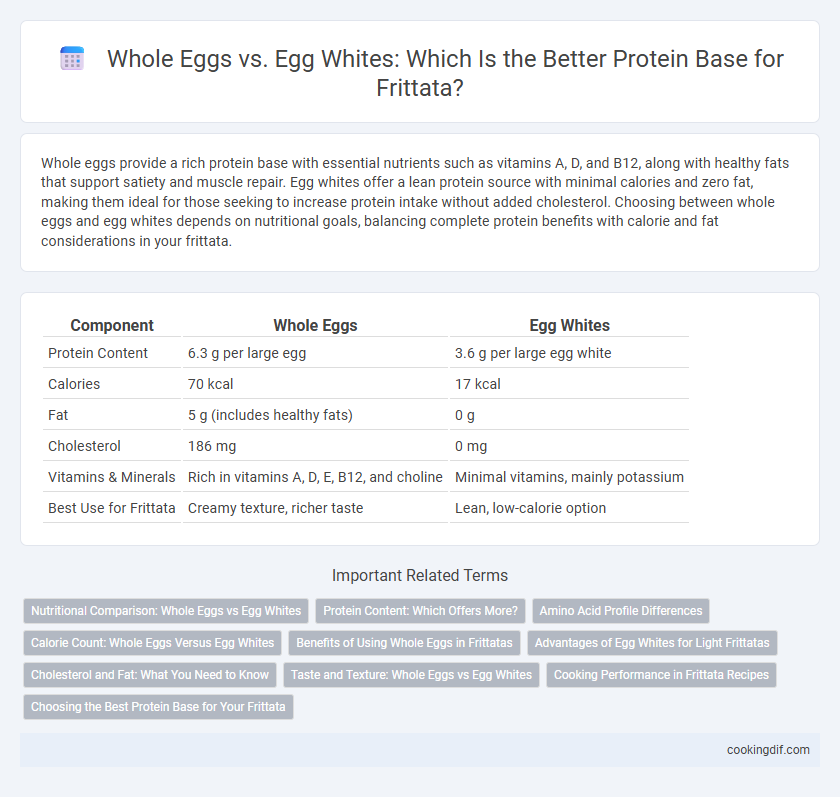Whole eggs provide a rich protein base with essential nutrients such as vitamins A, D, and B12, along with healthy fats that support satiety and muscle repair. Egg whites offer a lean protein source with minimal calories and zero fat, making them ideal for those seeking to increase protein intake without added cholesterol. Choosing between whole eggs and egg whites depends on nutritional goals, balancing complete protein benefits with calorie and fat considerations in your frittata.
Table of Comparison
| Component | Whole Eggs | Egg Whites |
|---|---|---|
| Protein Content | 6.3 g per large egg | 3.6 g per large egg white |
| Calories | 70 kcal | 17 kcal |
| Fat | 5 g (includes healthy fats) | 0 g |
| Cholesterol | 186 mg | 0 mg |
| Vitamins & Minerals | Rich in vitamins A, D, E, B12, and choline | Minimal vitamins, mainly potassium |
| Best Use for Frittata | Creamy texture, richer taste | Lean, low-calorie option |
Nutritional Comparison: Whole Eggs vs Egg Whites
Whole eggs provide about 6 grams of protein, 5 grams of fat, and essential nutrients like vitamin D, choline, and antioxidants per large egg, while egg whites offer around 3.6 grams of protein with negligible fat and calories. Whole eggs contain all essential amino acids and important micronutrients that support brain health and muscle recovery, whereas egg whites mainly contribute pure protein and are lower in cholesterol. Choosing between whole eggs and egg whites depends on balancing higher nutrient density and healthy fats versus lower calories and fat content for specific dietary needs.
Protein Content: Which Offers More?
Whole eggs contain approximately 6 grams of protein per large egg, with the protein distributed between the yolk and the white, while egg whites offer about 3.6 grams of protein each but are fat-free and lower in calories. The yolk provides essential nutrients such as vitamins A, D, E, and B12, which are absent in egg whites, making whole eggs a richer protein source with added nutritional benefits. For maximizing protein intake in frittatas, whole eggs deliver a more balanced profile of protein and nutrients compared to egg whites alone.
Amino Acid Profile Differences
Whole eggs provide a complete amino acid profile essential for muscle repair and growth, containing all nine essential amino acids in optimal ratios. Egg whites primarily consist of albumin, offering a high-protein, low-fat option but lack some fat-soluble vitamins and essential fatty acids found in yolks. Choosing whole eggs as the protein base in frittatas ensures a balanced intake of both essential amino acids and healthy fats, enhancing nutritional value and satiety.
Calorie Count: Whole Eggs Versus Egg Whites
Whole eggs contain approximately 70 calories each with about 6 grams of protein, while egg whites provide roughly 17 calories and 3.6 grams of protein per egg white. The fat and cholesterol in whole eggs contribute to the higher calorie count but also supply essential nutrients like vitamin D and choline. Choosing egg whites reduces calorie intake significantly, making them ideal for low-calorie, high-protein frittata recipes focused on weight management.
Benefits of Using Whole Eggs in Frittatas
Using whole eggs in frittatas provides a balanced source of high-quality protein along with essential nutrients such as vitamins A, D, E, and B12, which are absent in egg whites. The yolks contain healthy fats and antioxidants like lutein and zeaxanthin, supporting eye health and improved nutrient absorption. Whole eggs also enhance the frittata's texture and flavor, creating a richer and more satisfying dish compared to egg whites alone.
Advantages of Egg Whites for Light Frittatas
Egg whites provide a lean protein source with minimal calories and no cholesterol, making them ideal for light frittatas. Their neutral flavor and fluffy texture contribute to a delicate, airy dish that highlights added vegetables and herbs. Utilizing egg whites supports a lower-fat, heart-healthy option without sacrificing protein content.
Cholesterol and Fat: What You Need to Know
Whole eggs contain essential nutrients and healthy fats but also have higher cholesterol and saturated fat content, which can impact heart health if consumed in excess. Egg whites offer a lower-fat, cholesterol-free protein source while retaining most of the egg's high-quality protein, making them ideal for reducing dietary cholesterol and fat intake. Choosing between whole eggs and egg whites depends on individual nutritional goals, particularly managing cholesterol levels and fat consumption.
Taste and Texture: Whole Eggs vs Egg Whites
Whole eggs provide a richer taste and creamier texture in frittatas due to the natural fats in yolks, enhancing flavor complexity and moisture. Egg whites create a lighter, fluffier texture with a neutral taste, making them ideal for low-fat, high-protein variations but often result in a less creamy mouthfeel. Combining whole eggs with egg whites balances protein content while maintaining a satisfying texture and flavor profile in the final dish.
Cooking Performance in Frittata Recipes
Whole eggs provide better cooking performance in frittatas due to their balanced ratio of fat and protein, resulting in a creamy texture and firm structure. Egg whites contribute high protein with low fat but often yield a drier, less cohesive frittata that can be more rubbery. Utilizing whole eggs enhances the flavor depth and improves browning, making the frittata more appealing both visually and in mouthfeel.
Choosing the Best Protein Base for Your Frittata
Whole eggs provide a balanced protein source in a frittata, containing both egg whites and yolks rich in vitamins A, D, E, and essential fatty acids. Egg whites offer a leaner protein option with minimal fat and calories while maintaining high-quality protein content, making them ideal for low-fat or low-cholesterol diets. Selecting whole eggs or egg whites affects the frittata's texture, flavor, and nutritional profile, so choose based on dietary goals and desired richness.
Whole eggs vs egg whites for protein base Infographic

 cookingdif.com
cookingdif.com